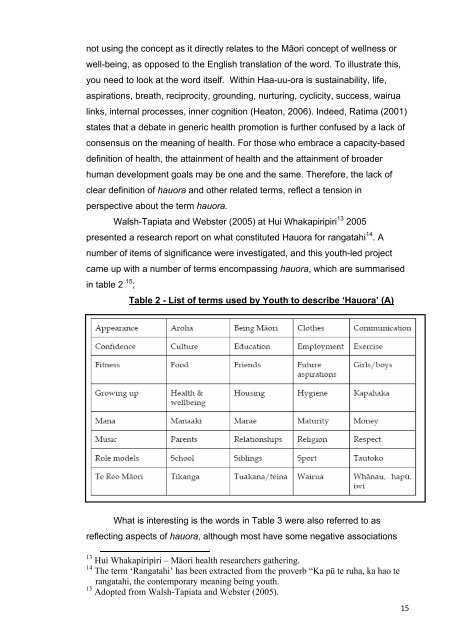Te Māoritanga WELLBEING AND IDENTITY Kapa Haka as a Vehicle
Te Māoritanga WELLBEING AND IDENTITY Kapa Haka as a Vehicle
Te Māoritanga WELLBEING AND IDENTITY Kapa Haka as a Vehicle
Create successful ePaper yourself
Turn your PDF publications into a flip-book with our unique Google optimized e-Paper software.
not using the concept <strong>as</strong> it directly relates to the Māori concept of wellness or<br />
well-being, <strong>as</strong> opposed to the English translation of the word. To illustrate this,<br />
you need to look at the word itself. Within Haa-uu-ora is sustainability, life,<br />
<strong>as</strong>pirations, breath, reciprocity, grounding, nurturing, cyclicity, success, wairua<br />
links, internal processes, inner cognition (Heaton, 2006). Indeed, Ratima (2001)<br />
states that a debate in generic health promotion is further confused by a lack of<br />
consensus on the meaning of health. For those who embrace a capacity-b<strong>as</strong>ed<br />
definition of health, the attainment of health and the attainment of broader<br />
human development goals may be one and the same. Therefore, the lack of<br />
clear definition of hauora and other related terms, reflect a tension in<br />
perspective about the term hauora.<br />
Walsh-Tapiata and Webster (2005) at Hui Whakapiripiri 13 2005<br />
presented a research report on what constituted Hauora for rangatahi 14 . A<br />
number of items of significance were investigated, and this youth-led project<br />
came up with a number of terms encomp<strong>as</strong>sing hauora, which are summarised<br />
in table 2 15 ;<br />
Table 2 - List of terms used by Youth to describe ‘Hauora’ (A)<br />
What is interesting is the words in Table 3 were also referred to <strong>as</strong><br />
reflecting <strong>as</strong>pects of hauora, although most have some negative <strong>as</strong>sociations<br />
13 Hui Whakapiripiri – Māori health researchers gathering.<br />
14 The term ‘Rangatahi’ h<strong>as</strong> been extracted from the proverb “Ka pū te ruha, ka hao te<br />
rangatahi, the contemporary meaning being youth.<br />
15 Adopted from Walsh-Tapiata and Webster (2005).<br />
15
















